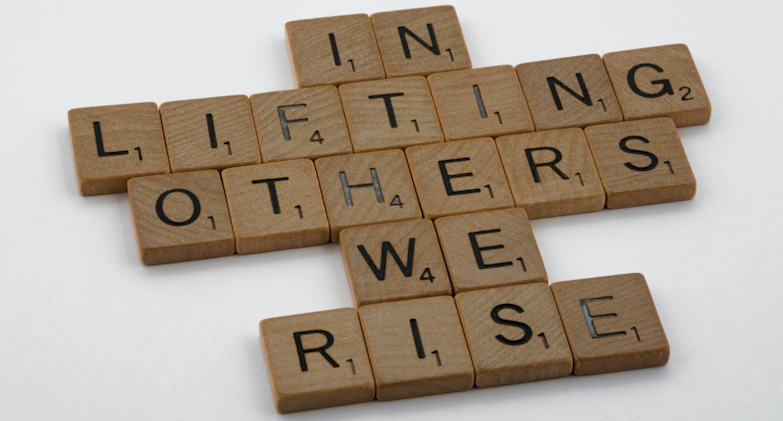This is the tenth and final area of focus in my Total Wellness program. Although I’m eager to get back to writing more spontaneously about the fascinating people and experiences I run across on a daily basis, I certainly appreciate the folks—both blog followers and wellness clients—who encouraged me to commit these last ten months to explaining my approach to total wellness and the fact that it can be an exciting and empowering life long journey!
If you know me at all, on any level, you are probably aware that I seek out quotes, reflections, experiences, and stories that inspire and challenge me. I recently ran across a story from an unknown author that really got at the heart of Communal Wellness. I found it so impactful I’d like to share it in full:
 “This is a short story of a farmer who grew award-winning corn. Each year he entered his corn in the state fair where it won a blue ribbon.
“This is a short story of a farmer who grew award-winning corn. Each year he entered his corn in the state fair where it won a blue ribbon.
One year a newspaper reporter interviewed him and learned something interesting about how he grew it. The reporter discovered that the farmer shared his seed corn with his neighbors.
‘How can you afford to share your best seed corn with your neighbors when they are entering corn in competition with yours each year?’ the reporter asked.
‘Why sir,’ said the farmer, ‘didn’t you know? The wind picks up pollen from the ripening corn and swirls it from field to field. If my neighbors grow inferior corn, cross-pollination will steadily degrade the quality of my corn. If I am to grow good corn, I must help my neighbors grow good corn.’
He is very much aware of the connectedness of life. His corn cannot improve unless his neighbor’s corn also improves.
So it is with our lives. Those who choose to live in peace must help their neighbors to live in peace. Those who choose to live well must help others to live well, for the welfare of each is bound up with the welfare of all.
And that is how to grow award-winning corn.
The lesson for each of us is this: If we are to grow good corn, we must help our neighbors grow good corn.”
I shared this story with several friends and asked them for their reactions. One person suggested we remove “good corn” in the last sentence: “If I am to grow, I must help my neighbor to grow!”
This was a lesson I learned early on from my mother. When I was about twelve my mother identified a senior in our little struggling community who lived alone since her father died several years earlier and needed someone to carry her coal buckets from the bin in her basement up the steps to her cooking stove, her only form of heat, in the kitchen.
I wasn’t at all excited about this possibility. Harriet was seen as a rather strange recluse by many folks—especially the kids in the neighborhood—and I was quite uncomfortable the day my mother took me to meet Harriet and introduce us.
Initially Harriet didn’t appear to be any more excited about this arrangement than I was! After some convincing on my mother’s part (and she could be convincing!) Harriet reluctantly agreed to “give it a try for a week.” She said all she could pay was a nickel a bucket. Before she finished the sentence my mother made it clear that I wouldn’t consider accepting any money! Actually, that wasn’t completely true—I would have considered it!— but obviously it wasn’t even a remote possibility.
That first week was very awkward, probably for Harriet as well as myself. Harriet was in her seventies, had severe arthritis, and was legally blind. She had been carrying the coal up herself, in smaller and smaller buckets, for years! The cellar steps were so narrow they were actually closer to being a ladder!
When I showed up the following day, the first thing Harriet said was, “there’s a little glass dish with nickels in it on the back of the table, take one for each bucket of coal you bring up. Your mother doesn’t need to know about this.”
It was tempting (way back then a nickel had a lot more buying power than it does today!). I thought a moment then said, “I appreciate your offer but my mother and I have an understanding.”
A slight smile flashed across her face for the first time and that was the last I ever saw of the glass dish full of nickels! However, soon thereafter her questions about what kind of treats I liked started. Rice Krispies marshmallow squares began to show up on the table. She also introduced me to homemade horehound candy which is a lot better than it sounds!
Several weeks into our routine she made some hot chocolate to have with my treats which was accompanied with a request to “sit a spell” while you “devour” those Rice Krispies treats. I quickly discovered Harriet was an intelligent, sensitive, and creative lady with a surprising sense of humor.
 Then came another pivotal event in our growing friendship, “Why don’t you just call me Hal? The few friends I have left still refer to me that way.” I remember sharing that with my mother when I got back home. She didn’t say a word but smiled as the tears began to flow down her cheeks!
Then came another pivotal event in our growing friendship, “Why don’t you just call me Hal? The few friends I have left still refer to me that way.” I remember sharing that with my mother when I got back home. She didn’t say a word but smiled as the tears began to flow down her cheeks!
Actually I wouldn’t be surprised if that experience with Hal didn’t set the course for my lifelong passion for community outreach and to some degree, even unconsciously impact my decision to include Communal Wellness as the tenth area of focus in our approach to Total Wellness!
While volunteering—both formally and in formally—is probably the first and most thought-of avenue to participate in Communal Wellness, that is only one side of the coin. Mom also often said, “Remember, being open to receiving can be as difficult as giving.”
This has been a lifelong challenge for me—one I am still working on. As a man, raised to “pull yourself up by your bootstraps” (actually an impossible task!) and not depend on anyone else, I find it incredibly difficult to accept help.
I asked Rita if she might have an example of a situation where I struggled to accept help from someone. Her response was immediate, “First give me an example of when you actually asked for help!” I guess that about says it for me!
It has taken me a long time to realize that while offering help is wonderful, if you are always in the position of giving rather than receiving, that risks putting you in a superior position, robbing the other person of the joy of giving and decreasing the chance for a mutual relationship of equals. It must go both ways if Communal Wellness is going to have a meaningful transformational impact on our Total Wellness journey!
Although accepting (or asking for!) help continues to be a growing edge for me, one of the benefits of aging is the opportunities for growth in this area. Over the last few years, I’ve noticed that when I go to put the electric lift on the back of our Subaru, it has mysteriously gotten much heavier!
A neighbor has graciously responded to this baffling situation by offering his help in loading the ever-heavier lift. This often leads to updates on each other’s families and occasionally a current struggle or concern. Other times it may be followed by a request to borrow a tool or a hand on a task he has at his house. None of this would have happened if I hadn’t accepted help. I expect asking for help will be a lifelong challenge for me, but “if” I continue to age I expect that alone will encourage my growth!
The opportunities for each of us to both “give and gain” from the Community Wellness reservoir are both as endless and unique as this sneaky God has created us. Attend a book club. Join or start a Meetup focused on one of your interests. Get to know your mail carrier, librarian, regular grocery cashier, and/or local vendor at the farmer’s market.

Rita displaying her winning smile with Terry on their quadrocycle
Reach out to people outside your usual social group. Seek out people older or younger than you, from different backgrounds and in different socioeconomic brackets, who dress differently or like different music. Don’t immediately “write off” people based on their political or religious beliefs; get to know them as people.
Develop relationship with your neighbors. Organize a block party, progressive dinner, storytelling house concert, bonfire, or musical jam session. Offer to snow-blow an elderly neighbor’s driveway or take care of handyman chores for a single mother. Start a neighborhood time/toy/tool swap or community garden. Invite new neighbors to dinner.
Don’t overlook the possibilities of social media either. Whether it’s reconnecting with old friends over Facebook or making new friends in online “communities,” the Internet opens even more opportunities for building Communal Wellness. To be frank, I hope this very blog is doing that in a variety of ways!
It’s important that we acknowledge and celebrate major efforts such as charity groups which are creating major improvements in Communal Wellness around the world. However, it is equally as important to realize that each of us can play a significant role in driving Communal Wellness to new levels just though our daily actions and interactions. Every effort—no matter how small—we can take to lift someone’s spirits, lighten their load, or encourage their journey is a step in the right direction.
Years ago while riding our quadrocycle on the rails-to-trails, Rita came up with a game to test who could make the most folks passing us on the other side of the trail smile without speaking (she has the most wins to date, hands down!). The ideas for improving Communal Wellness are only limited by the boundaries of our imagination!
QUESTIONS FOR DEEPENING THE SPIRITUAL JOURNEY
- How would you define community and Communal Wellness?
- What communities have you been and are you currently a part of? What are your best experiences of community? What negative experiences have you had? What do you think was the underlying reason for the different experiences?
- Have you ever been to a town/church/class/group and immediately felt a positive atmosphere? What do you think you were picking up on and how can you incorporate those same characteristics in communities you are a part of?
- Who do you know that is a superstar at building community? How do they do it? Is there anything they do that you could adopt to enhance your own community-building ability?
- How do you currently contribute to community—and how much? Are you happy with your contribution or do you feel you contribute too much or too little?
- How does accepting help make you feel? How about asking for help? Do you refuse to ask for help that you would be glad to provide for others? If so, why do you hold yourself to a different standard?
- How do you think Community Wellness fits in with your spiritual beliefs?
Banner photo by Brett Jordan on Unsplash.com


Hey Terry – I probably don’t say this enough to you, but thanks for your insights and this blog. This one reminded me of all the communal activities we do as friends . thanks for the thoughts. Keith
As always, your blog always encourages me to reflect on who I am & how I might improve my relationship with others.